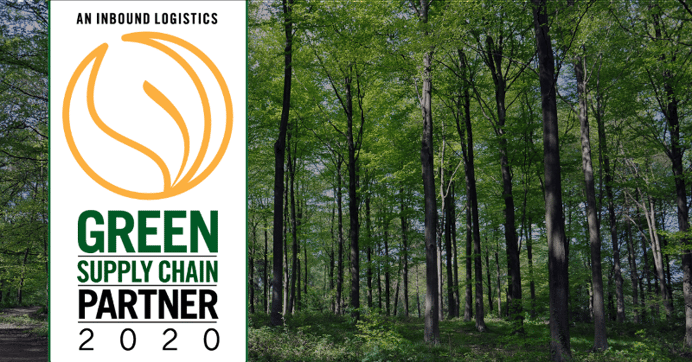How Wooden Pallets Drive Sustainability and Efficiency
Choosing wooden pallets over other materials supports both operational and environmental priorities in your supply chain. Here’s how.
In business, there’s a never-ending need to identify opportunities to be more efficient. Today, this doesn’t just mean lowering overhead and streamlining processes; being more efficient must also include a commitment to sustainability. Choosing wooden pallets over other materials supports both operational and environmental priorities in your supply chain. Here’s how.
Wooden Pallets, by Nature, Are More Responsible
U.S. wooden pallets recently earned an Environmental Product Declaration (EPD), the first for a product in the distribution packaging space. An estimated 90% of all products are shipped on pallets, and 90% of all those pallets are made of wood, according to a 2019 Modern Material Handling Pallet Survey. It’s clear that the industry plays an essential role in the circular economy.
Even with astronomically high lumber prices, the circular economy of wooden pallets demonstrates how this material positively impacts business:
Forest Sustainability.
It’s not often advertised but American forests are growing strong. In fact, one-third of the United States is forested and there are 20 percent more trees than there were nearly 50 years ago. Through sustainable management practices of this incredible renewable resource, more than one billion trees are planted in the U.S. each year. Even when wooden pallets reach the end of their lifecycle, new pallets can be built without having a negative impact on the environment.
Positive Carbon Impact.
A feature that is often overlooked when considering what kind of pallets to use is the potential for lowering a company’s carbon footprint. Each time wooden pallets are chosen over other materials, such as plastic, less carbon is emitted into the atmosphere. Once a wooden pallet has reached end of life, it can be repurposed into fuel or other materials, which can also reduce the need for natural gas—further adding to the potential net positive carbon impact. (More on that in this recent USDA report.)
Job Growth.
Beyond the environmental advantages of using wooden pallets as part of your supply chain operation, there are economic benefits. A 2018 study from the Center for Manufacturing Research found that the wooden pallet and container manufacturing industry generates a total economic impact of $31 billion in economic activity in the U.S. The sector also has a direct or indirect impact on more than 173,000 jobs. By choosing wooden pallets, companies can support the employment rate.
[A formal issue resolution process ensures customer satisfaction and benefits large organizations. See what we've learned along the way of making sure every team member is a customer-focused quality pro.]
Recyclability.
Finally, wooden pallets can be recycled and used a number of ways. In fact, nearly 95 percent of wooden pallets are recovered, repaired and recycled. (Comparatively, just over 10 percent of alternative materials, such as plastic, are recycled.) When wooden pallets eventually reach end of life after traveling thousands of miles in the supply chain, worn pallets are disassembled instead of being sent to the landfills and their components go on to create new materials.
Helping Others Increase Sustainability Begins with Our Operations
Choosing wooden pallets in your supply chain is a huge step toward improved long-term cost and environmental-efficiency. As an asset-based pallet supplier, 48forty serves as a one-stop shop for all things pallet management. With 100% control over (and accountability for) our products and services, our team is proactive in monitoring and documenting every pallet at every touchpoint. Doing so extends the lifecycle of pallets, which results in both cost and environmental benefits for us and our customers.
At the center of providing quality end-to-end pallet management is consistency. Each of our 225 facilities and 45 plants across North America follow the same processes and expectations from delivery to organization, repair to recycling. This seamless process ensures maximum investment benefit—and helps keep your operation running smoother.
Beyond our products and services, 48forty integrates sustainability into the other facets of our business. Our team is well-versed in safe, environmentally friendly practices. We also look for opportunities to serve as stewards for our communities, and we strongly advocate for our industry.
When you combine the circular economy of wooden pallets with the control and management provided by an asset-based pallet supplier, the picture becomes very clear. From seedling to recycling, wooden pallets effectively improve the sustainability and efficiency of a supply chain.



